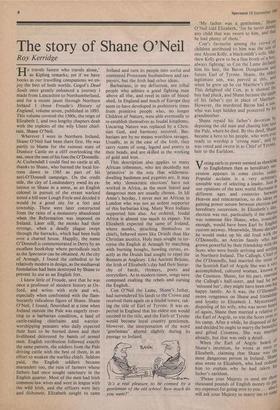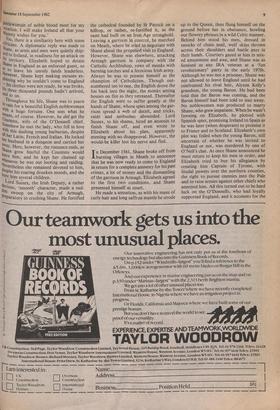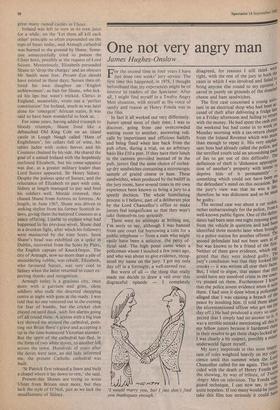The story of Shane O'Neil
Roy Kerridge
'He travels fastest who travels alone,' as Kipling remarks; yet if we have books as our travelling companions we en- joy the best of both worlds. Gogol's Dead Souls once greatly enhanced a journey I made from Lancashire to Northumberland, and for a recent jaunt through Northern Ireland I chose Froude's History of England, volume seven, published in 1893. This volume covered the 1560s, the reign of Elizabeth I, and two lengthy chapters dealt with the exploits of the wily Ulster chief- tain, Shane O'Neil.
Wherever I went in Northern Ireland, Shane O'Neil had been there first. He was partly to blame for the ruinous state of Dunluce Castle on a cliff overlooking the sea, once the seat of his foes the 0' Donnells. At Cushendall 1 could find no castle at all, thanks to Shane, who burned the local for- tress down in 1565 as part of his anti-O'Donnell campaign. On the credit side, the city of Londonderry owed its ex- istence to Shane in a sense, as an English colonel in pursuit of the errant warlord noted a hill near Lough Foyle and decided it would be a good site for a fort and township. These were later constructed from the ruins of a monastery abandoned when the Reformation was imposed on Ireland. Later still, the monks had their revenge, when a deadly plague swept through the barracks, which had been built over a charnel house. Happily, the name O'Donnell is commemorated in Derry by an excellent bookshop where periodicals such as the Spectator can be obtained. At the city of Armagh, I found the cathedral to be relatively modern in design, as the mediaeval foundation had been destroyed by Shane to prevent its use as an English fort.
I know little of Froude, save that he was once a professor of modern history at Ox- ford, and writes with style and wit, especially when confronted with the flam- boyantly ridiculous figure of Shane. Shane O'Neil, I found, flourished at a time when Ireland outside the Pale was eagerly rever- ting to a barbarian condition, a land of cattle-raiding chieftains and warrior- worshipping peasants who daily expected their huts to be burned down and their livelihood destroyed by bands of armed men. English retribution followed exactly the same pattern, the soldiers from the Pale driving cattle with the best of them, in an effort to weaken the warlike chiefs. Seldom paid, the English soldiers became marauders too, the ruin of farmers whose fathers had once sought sanctuary in the English quarter. Most of the men had Irish common-law wives and were in league with the wild Irish, and the officers were lazy and dishonest. Elizabeth sought to tame Ireland and turn its people into useful and contented Protestant husbandmen and tax- payers, but the Irish had other ideas.
Barbarians, in my definition, are tribal people who admire a good fighting man above all else, and revel in tales of blood- shed. In England and much of Europe they seem to have developed in prehistoric times from primitive people who, no longer Children of Nature, were able eventually to re-establish themselves as feudal kingdoms. Uncaring Nature was replaced by a Chris- tian God, and harmony restored. Bar- barians are by no means worthless savages. Usually, as in the case of the Irish, they carry reams of song, legend and poetry in their heads, and are skilled in the working of gold and iron.
This description also applies to many African tribesmen, who are decidedly not `primitive' in the way that wilderness- dwelling bushmen and pygmies are. It may be why 'democratic elections' have not worked in Africa, as the most feared and dangerous men are usually chosen. In Idi Amin's heyday, I never met an African in London who was not an ardent supporter of this barbarian king. Many West Indians supported him also. An ordered, feudal Africa is almost too much to expect. Yet Elizabeth expected the same of Ireland, where monks, attaching themselves to chiefs, behaved more like Druids than like Christian ascetics. Holy men sought to ter- rorise the English at Armagh by marching with burning boughs, howling curses, ex- actly as the Druids had sought to repel the Romans at Anglesey. Like Ancient Britons, the Irish of Elizabeth's day had their hierar- chy of bards, rhymers, poets and storytellers. As in modern times, songs were composed exalting the rebels and cursing the English.
Con O'Neil the Lame, Shane's father, had surrendered his lands to the Crown and received them again on a feudal tenure, tak- ing the title of Earl of Tyrone. It was ex- pected in England that his eldest son would succeed to the title, and the Earls of Tyrone would become loyal country gentlemen. However, the interpretation of the word 'gentleman' altered slightly during its passage to Ireland.
'It's a real pleasure to be conned by a gentleman of the old school: how much do you want?'
'My father was a gentleman,' Shane O'Neil told Elizabeth, 'for he never dented any child that was sworn to him, and that he had plenty of them.'
Con's favourite among the crowd 0f,, children attributed to him was the son 01 one Alyson Kelly, a blacksmith's wife. Mat" thew Kelly grew to be a fine broth of a boy, always fighting; so Con the Lame declared him his heir, the Baron Dungannon and future Earl of Tyrone. Shane, the eldest legitimate son, was peeved at this, and when he grew up he cut Matthew's throat. This delighted old Con, as it showed the boy had pluck, and Shane became the aPPle of his father's eye in place of Matthew. However, the murdered Baron had a son, who was kept hidden and protected by his grandmother. Shane repaid his father's devotion. by deposing the old man and chasing him into the Pale, where he died. By this deed, Shane became a hero to his people, who were ever ready to worship a 'strong man', and he was voted and sworn in as Chief of Tyrone, heir to the Earldom.
Voting earls to power seemed as shocking to Englishmen then as hereditary sac" cession appears in some circles toclaY. Popular acclaim is a very arbitrary', unstable way of selecting a leader. Just our opinions of the next world fluctuate in different ages and countries between Heaven and reincarnation, so do ideas on gaining power seesaw between election and hereditary succession. In Elizabeth's daY; election was out, particularly if the elected was someone like Shane, who, ironically enough, would have been Earl by English custom anyway. Meanwhile, Shane decided he would make up his old feud with the, O'Donnells, an Antrim family who had grown powerful by their friendship with the Scots who were busily arriving and settling in Northern Ireland. The Callogh, Chief of the O'Donnells, had married the sister of the Scottish Earl of Argyle She was a very accomplished, cultured woman, known as the Countess. Shane, for his part, married the Callogh's half-sister, and had he not 'misused her', they might have been one big happy family. As it was, the O'Donnells swore vengeance on Shane and friendship and loyalty to Elizabeth I. MysteriouslYd disposing of his wife, who was never hear, of again, Shane then married a relative 0' the Earl of Argyle, to win the Scots over to his camp. After a while, he disposed of tierand decided he ought to marry the beautiful and gifted Countess. She was marriedl
already, but that was only a detail. of
When the Earl of Argyle heard Shane's intention, he wrote at once to Elizabeth, claiming that Shane was the most dangerous person in Ireland. Shane, also wrote to Elizabeth, who had ordered him to explain why he had taken his father's earldom. 'Please your Majesty to send me three thousand pounds of English money to PI my expenses for going over to you ... also will ask your Majesty to marry me to some gentlewoman of noble blood meet for my vacation. I will make Ireland all that your Majesty wishes for you.' Yes, there is a similiarity here with some Africans. A diplomatic reply was made to Shane, as arms and men were quietly ship- ped to Ireland, in readiness for an attack on his territory. Elizabeth hoped to detain Shane in England as an enforced guest, so ,,as to leave his unruly lands leaderless. However, Shane kept making excuses ex- plaining why he couldn't come to England
his clothes were not ready, he was broke,
hIs three thousand pounds hadn't arrived, and so on.
Throughout his life, Shane was to yearn In vain for a beautiful English noblewoman
th a huge fortune. One sees what he means, of course. However, he did get the ,.,'"ountess, wife of the O'Donnell chief. Somehow he met the lady, who fell in love with this dashing young barbarian, despite all her Latin, French and Italian. He locked her husband in a dungeon and carried her oawaY. Here, however, the romance ends, as leave grew fearful the Countess would him, and he kept her chained up whenever he was out looting and raiding. Nevertheless she remained devoted to him, bore his roaring drunken moods, and she P1"e him several children. Lord_ Sussex, the Irish Deputy, a rather ,devious, 'smooth' character, made a sud- "'en swoop on the city of Armagh, preparatory to crushing Shane. He fortified
the cathedral founded by St Patrick on a hilltop, or rather, re-fortified it, as the saint had built on an Iron Age stronghold. Leaving a garrison in control, he marched on Meath, where he tried to negotiate with Shane about the proposed visit to England. However, Shane was elsewhere, attacking Armagh garrison in company with the Catholic Archbishop, rows of monks with burning torches and a ferocious Irish army. Always he was to present himself as the champion of Catholicism. Though out- numbered ten to one, the English drove the foe back into the night, the monks setting houses on fire as they retreated. Thereafter the English were to suffer greatly at the hands of Shane, whose spies among the gar- rison spread a web of deceit, and tricks, raids and ambushes abounded. Lord Sussex, to his shame, hired an assassin to finish Shane off, and even wrote to Elizabeth about his plan, apparently meeting with no disapproval. However, the would-be killer lost his nerve and fled.
In December 1561, Shane broke off from burning villages in Meath to announce that he was now ready to come to England in return for a complete amnesty for his past crimes, a lot of money and the dismantling of the garrison in Armagh. Elizabeth agreed to the first two conditions, and Shane presented himself at court.
He made a sensation, as with his mane of curly hair and long saffron mantle he strode up to the Queen, then flung himself on the ground before her in obeisance, howling out flowery phrases in a wild Celtic manner. Behind him stood his men, dressed in smocks of chain mail, wolf skins thrown across their shoulders and battle axes in their hands. Courtiers gazed at him in mix- ed amusement and awe, and Shane was as lionised as any IRA veteran at a `fun revolutionary' party in the early 1970s. Although he was not a prisoner, Shane was not allowed to leave England until he had confronted his rival heir, Alyson Kelly's grandson, the young Baron. He had been told that the Baron was coming, and the Baron himself had been told to stay away. No noblewomen was produced to marry Shane, who grew impatient. When he wasn't fawning on Elizabeth, he plotted with Spanish spies, promising Ireland to Spain as he was later (when desperate) to promise it to France and to Scotland. Elizabeth's own plot was foiled when the young Baron, still uncertain of whether he was invited to England or not, was murdered by one of O'Neil's clan. At once Shane announced he must return to keep his men in order, and Elizabeth tried to buy his allegiance by creating him Captain of Tyrone, with feudal powers over the northern counties, the right to pursue enemies into the Pale and to raise armies against other chiefs who annoyed him. All this turned out to be hard luck on the O'Donnells, who had loyally supported England, and it accounts for the great many ruined castles in Ulster.
Ireland was left to stew in its own juice for a while, on the 'Let them all kill each other' principle so often expounded on the tops of buses today, and Armagh cathedral was burned to the ground by Shane. Some- one unsuccessfully tried to poison the Ulster hero, possibly at the request of Lord Sussex. Mysteriously, Elizabeth persuaded Shane to 'drop the charges' and an obscure Mr Smith went free. Private Eye should have existed in those days. Sussex then of- fered his own daughter an 'English noblewoman', as bait for Shane, who lick- ed his lips but wasn't tricked. Clerics in England, meanwhile, wrote out a 'perfect constitution' for Ireland, much as was later done for 'emergent' African states. It was said to have been wonderful to look at.
For some years, having added triumph to bloody triumph, Shane lived like a debauched Old King Cole on an island castle in Lough Neagh called 'Hate of Englishmen', his cellars full of wine, .his tables laden with stolen beeves and his Countess chained by his side. He shared the goal of a united Ireland with the hopelessly outfoxed Elizabeth, but his come-uppance was due, as a greater military leader than Lord Sussex appeared, Sir Henry Sidney. Despite the jealous spite of Sussex, and the reluctance of Elizabeth to part with coin, Sidney at length managed to pay and feed his soldiers well. Morale restored, they chased Shane from fortress to fortress. At , length, in June 1567, Shane was driven to seeking shelter from his former Scottish in- laws, giving them the battered Countess as a peace offering. Unable to explain what had happened to his previous wives, Shane died in a drunken fight, after which his followers were massacred by the irate Scots. Soon Shane's head was exhibited on a spike in Dublin, recovered from the Scots by Piers, the English captain of Knockfergus. The city of Armagh, now no more than a pile of smouldering rubble, was rebuilt. Elizabeth, who favoured Sussex, was very cool to Sidney when the latter returned to court ex- pecting thanks and recognition.
Armagh today is a gracious city, once more with a garrison and grim, silent soldiers who stalk the deserted shopping centre at night with guns at the ready. I was told that no one ventured out in the evening for fear of bombs, but the cricket club played on until dusk, with fire alarms going off all round them. A sexton with a big iron key showed me around the cathedral, poin- ting out Brian Boru's grave and accepting a tip in the time-honoured Victorian manner. But the spirit of the cathedral has fled, in the form of two white doves, to another hill across the town. Hundreds of years after the doves were seen, an old lady informed me, the present Catholic cathedral was built.
`St Patrick first released a fawn and built a chapel where it lay down to rest,' she said.
Present-day Shanes are trying to wrest Ulster from Britain once more, but they lack the style of O'Neil, just as we lack the steadfastness of Sidney.




































 Previous page
Previous page